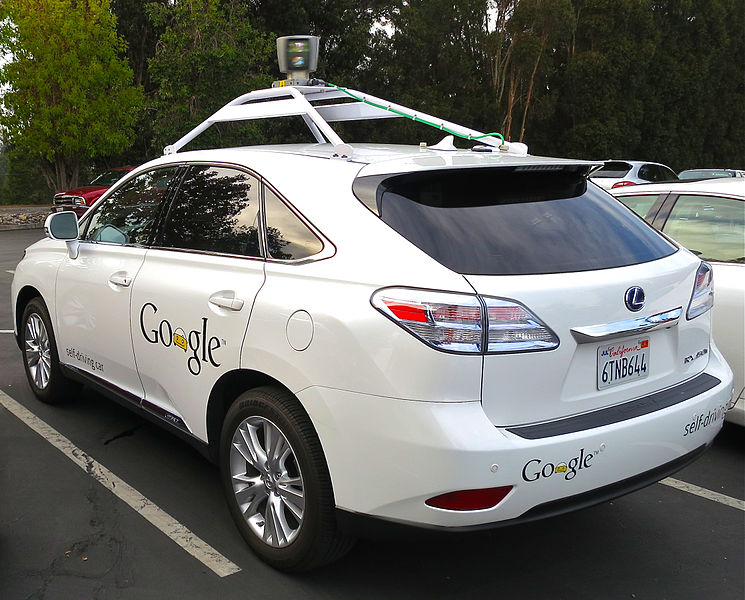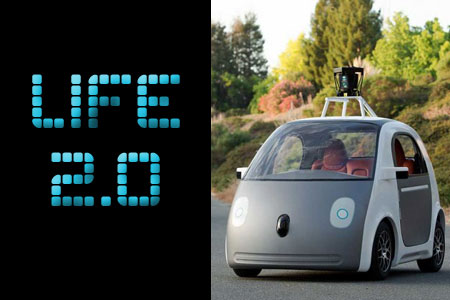Google has been working on a self-driving car for a few years now, completing over 1 million km on US roads in five different states in the last two years. It has been reported that the Google car is safer than human drivers as the vehicle's camera sees everything in the slightest detail in a 360 degree angle and react within a fraction of a second to its environment, something that no human driver could ever dream of achieving. Besides this computerized driver never gets tired or distracted. 1.2 million people die on the road every year around the world. Self-driven cars could save those lives.
Autonomous cars would also be able to adjust their speed according to GPS traffic data or even remote signals from other cars and traffic lights, which would enable them to drive optimally to reduce travel time and consumption (although by then we hope that all autonomous cars will be electric). Ideally, once most cars are computerized, traffic lights should all communicate together and lights change in function of the incoming traffic in various directions.
In addition to accrued safety and speed, it would be much more relaxing to be chauffeured around than to actually have to drive. It would reduce stress, eliminate noise pollution from honking, and allow people to read, talk on the phone, nap, think, day-dream or whatever. Even better, driving licences wouldn't be required any more, and almost anyone who can't drive alone at present, be them teenagers, the very elderly or the disabled, could be taxied around in their own cars in all safety. That will bring about a true revolution in transportation.
Google hasn't been the only company working on self-driven cars. Tesla, Nissan, Toyota, Volvo, Audi, BMW, Mercedes-Benz, Daimler and Ford and General Motors, among others, have all being working on projects of their own. Semi-autonomous cars with automatic steering, braking, lane guidance and parking are already on the market. The first fully autonomous cars are expected to make their entry in 2016 (Tesla) and 2018 (Google).
In my opinion, autonomous cars will replace human-driven cars within 15 years' time, although IHS Automotive predicts that this won't happen until 2035. Obviously there are going to be differences of years or even decades between countries, and perhaps also between cities (where self-driven cars are far more advantageous) and the countryside.
We could argue that governments should at some point ban human-driven cars as they would become a public safety concern. Not only are human drivers much more likely to cause accidents, but they also wouldn't be able to interact automatically with GPS and other wireless signals which will help the traffic to auto-regulate.

Autonomous cars would also be able to adjust their speed according to GPS traffic data or even remote signals from other cars and traffic lights, which would enable them to drive optimally to reduce travel time and consumption (although by then we hope that all autonomous cars will be electric). Ideally, once most cars are computerized, traffic lights should all communicate together and lights change in function of the incoming traffic in various directions.
In addition to accrued safety and speed, it would be much more relaxing to be chauffeured around than to actually have to drive. It would reduce stress, eliminate noise pollution from honking, and allow people to read, talk on the phone, nap, think, day-dream or whatever. Even better, driving licences wouldn't be required any more, and almost anyone who can't drive alone at present, be them teenagers, the very elderly or the disabled, could be taxied around in their own cars in all safety. That will bring about a true revolution in transportation.
Google hasn't been the only company working on self-driven cars. Tesla, Nissan, Toyota, Volvo, Audi, BMW, Mercedes-Benz, Daimler and Ford and General Motors, among others, have all being working on projects of their own. Semi-autonomous cars with automatic steering, braking, lane guidance and parking are already on the market. The first fully autonomous cars are expected to make their entry in 2016 (Tesla) and 2018 (Google).
In my opinion, autonomous cars will replace human-driven cars within 15 years' time, although IHS Automotive predicts that this won't happen until 2035. Obviously there are going to be differences of years or even decades between countries, and perhaps also between cities (where self-driven cars are far more advantageous) and the countryside.
We could argue that governments should at some point ban human-driven cars as they would become a public safety concern. Not only are human drivers much more likely to cause accidents, but they also wouldn't be able to interact automatically with GPS and other wireless signals which will help the traffic to auto-regulate.



